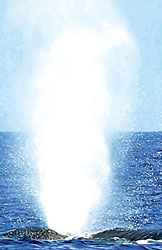As Sri Lanka takes steps to carry out offshore oil exploration in the Gulf of Mannar, a marine biologist has drawn attention to possible harm it could cause to sea mammals such as whales and dolphins.
Addressing a forum organized by the Wildlife and Nature Protection Society (WNPS) Marine biologist Asha de Vos urged the authorities to carry out explorations in a cautious manner because sound generated by underwater explosions could be harmful to marine mammals.
The Gulf of Mannar basin where plans are underway for offshore oil exploration has been identified as a haven for dolphins and whales.
 |
| Whales enjoying Lanka’s waters - a marine sanctuary. |
“These threatened species are sensitive to sound and are much vulnerable to noise pollution,” Ms. de Vos said pointing out that the initial phase of the locating the correct spot for drilling involved firing air guns and gas exploders into the ocean depth.
Underwater seismic explosions typically reach 260 decibels but scientists believe marine mammals are injured by volumes higher than 180 decibels. Research shows that marine mammals move away from offshore oil drilling sites to save themselves.
According to the UK-based Whale and Dolphin Conservation Society, she said there was evidence to show that excessive noise caused hearing loss in cetaceans (whales, dolphins and porpoises), injuring them and causing them to strand — and sometimes killing them.
The International Whaling Commission (IWC) too had acknowledged that air guns used in oil drilling were a possible threat to whales, dolphins, squids and other species in the oceans, she said adding that the blasts could also kill smaller fish causing a food shortage to the marine mammals that feed on fish.
Sri Lanka comes within the Indian Ocean Marine Sanctuary which is home to 27 marine mammals. The commercial whaling is banned in the sanctuary but now sound pollution could emerge as one of the main threats to the whales.
Ms. de Vos said noise generated by naval vessels also affected marine mammals. “By singing at low frequencies, whales communicate across oceans. It is how they keep track of their food and alert friends of a good place to eat,” she said.
The world's commercial fleet has doubled in size within the past few decades, reducing the distance whales could communicate by 90 percent, according to a report by Whale and Dolphin Conservation Society. This ‘ship traffic’ also affects whales’ breeding cycles as many whales use love songs that can be heard as long as 3000km to find a mate. Whales are slow breeders and disturbances to this communication mean they will be more vulnerable to extinction.
WNPS President Douglas Ranasinghe said Sri Lanka was yet to implement a strong conservation plan to protect the threatened marine mammals.
He also called for guidelines to control the commercial whale-watching tours as it also posed a threat to marine mammals in Sri Lanka’s waters.
Facts about seismic testing
In the last year, whale deaths believed to be related to noise pollution have occurred off the coasts of Baja in California, the Canary Islands, and the San Juan Islands.
Seismic explosions typically reach 260 decibels but scientists believe marine mammals are injured by volumes higher than 180 decibels.
Physical impacts of seismic survey noise on marine mammals are believed to include auditory masking or confusion, temporary hearing loss, brain haemorrhage and even death.
Source: www.greenpeace.org |
